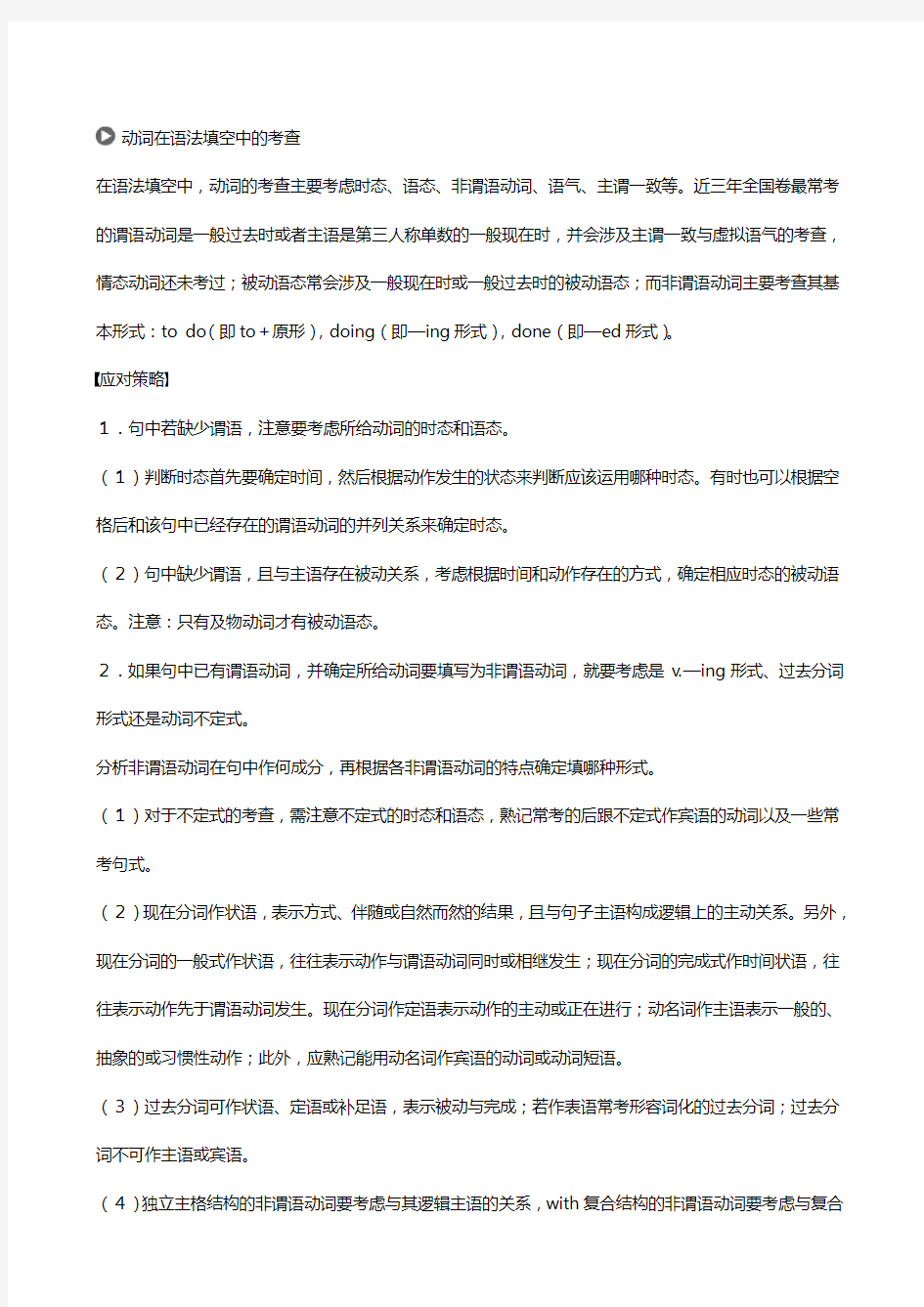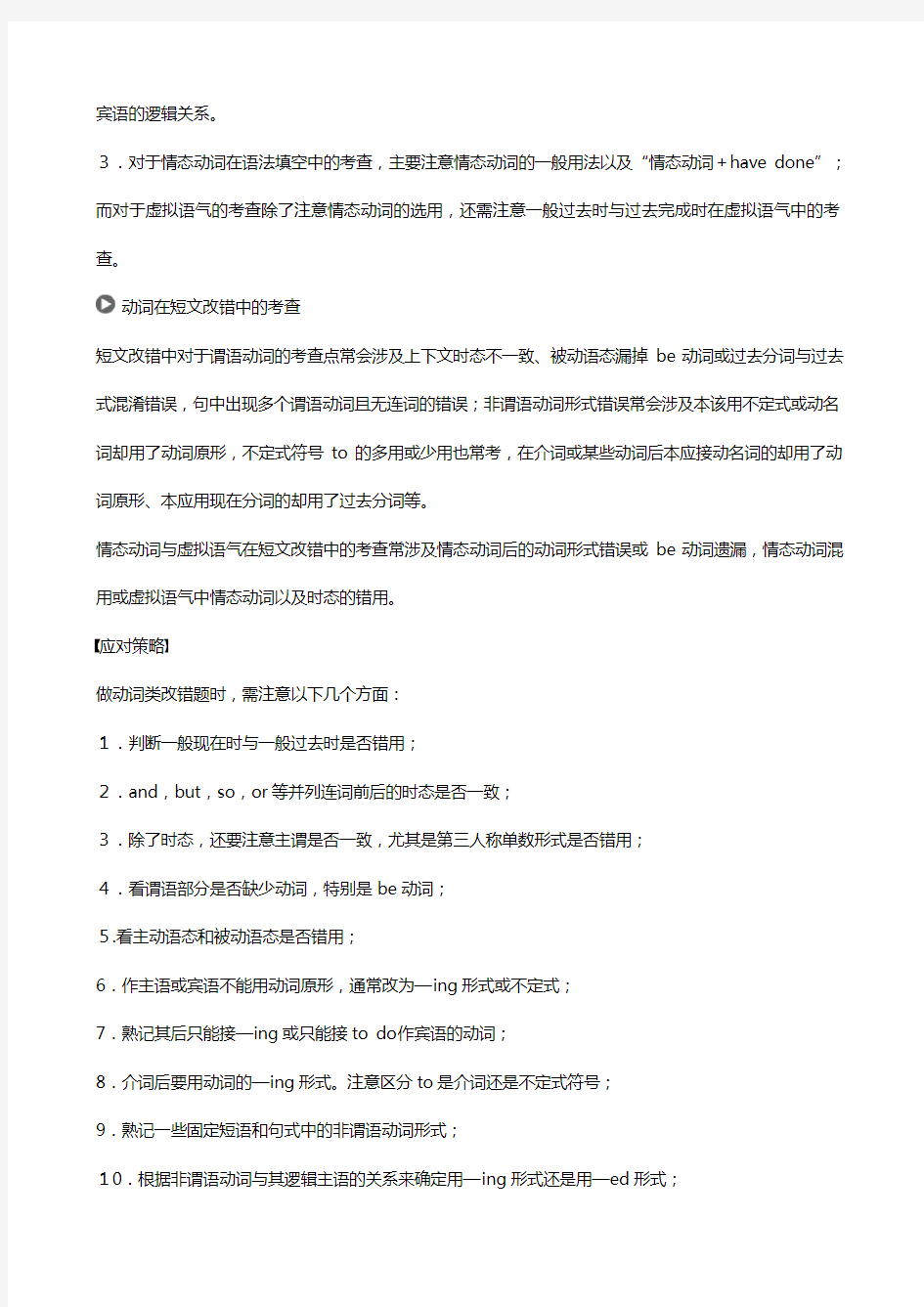

动词在语法填空中的考查
在语法填空中,动词的考查主要考虑时态、语态、非谓语动词、语气、主谓一致等。近三年全国卷最常考的谓语动词是一般过去时或者主语是第三人称单数的一般现在时,并会涉及主谓一致与虚拟语气的考查,情态动词还未考过;被动语态常会涉及一般现在时或一般过去时的被动语态;而非谓语动词主要考查其基本形式:to do(即to+原形),doing(即—ing形式),done(即—ed形式)。
应对策略
1.句中若缺少谓语,注意要考虑所给动词的时态和语态。
(1)判断时态首先要确定时间,然后根据动作发生的状态来判断应该运用哪种时态。有时也可以根据空格后和该句中已经存在的谓语动词的并列关系来确定时态。
(2)句中缺少谓语,且与主语存在被动关系,考虑根据时间和动作存在的方式,确定相应时态的被动语态。注意:只有及物动词才有被动语态。
2.如果句中已有谓语动词,并确定所给动词要填写为非谓语动词,就要考虑是v.—ing形式、过去分词形式还是动词不定式。
分析非谓语动词在句中作何成分,再根据各非谓语动词的特点确定填哪种形式。
(1)对于不定式的考查,需注意不定式的时态和语态,熟记常考的后跟不定式作宾语的动词以及一些常考句式。
(2)现在分词作状语,表示方式、伴随或自然而然的结果,且与句子主语构成逻辑上的主动关系。另外,现在分词的一般式作状语,往往表示动作与谓语动词同时或相继发生;现在分词的完成式作时间状语,往往表示动作先于谓语动词发生。现在分词作定语表示动作的主动或正在进行;动名词作主语表示一般的、抽象的或习惯性动作;此外,应熟记能用动名词作宾语的动词或动词短语。
(3)过去分词可作状语、定语或补足语,表示被动与完成;若作表语常考形容词化的过去分词;过去分词不可作主语或宾语。
(4)独立主格结构的非谓语动词要考虑与其逻辑主语的关系,with复合结构的非谓语动词要考虑与复合
宾语的逻辑关系。
3.对于情态动词在语法填空中的考查,主要注意情态动词的一般用法以及“情态动词+have done”;而对于虚拟语气的考查除了注意情态动词的选用,还需注意一般过去时与过去完成时在虚拟语气中的考查。
动词在短文改错中的考查
短文改错中对于谓语动词的考查点常会涉及上下文时态不一致、被动语态漏掉be动词或过去分词与过去式混淆错误,句中出现多个谓语动词且无连词的错误;非谓语动词形式错误常会涉及本该用不定式或动名词却用了动词原形,不定式符号to的多用或少用也常考,在介词或某些动词后本应接动名词的却用了动词原形、本应用现在分词的却用了过去分词等。
情态动词与虚拟语气在短文改错中的考查常涉及情态动词后的动词形式错误或be动词遗漏,情态动词混用或虚拟语气中情态动词以及时态的错用。
应对策略
做动词类改错题时,需注意以下几个方面:
1.判断一般现在时与一般过去时是否错用;
2.and,but,so,or等并列连词前后的时态是否一致;
3.除了时态,还要注意主谓是否一致,尤其是第三人称单数形式是否错用;
4.看谓语部分是否缺少动词,特别是be动词;
5.看主动语态和被动语态是否错用;
6.作主语或宾语不能用动词原形,通常改为—ing形式或不定式;
7.熟记其后只能接—ing或只能接to do作宾语的动词;
8.介词后要用动词的—ing形式。注意区分to是介词还是不定式符号;
9.熟记一些固定短语和句式中的非谓语动词形式;
10.根据非谓语动词与其逻辑主语的关系来确定用—ing形式还是用—ed形式;
11.别混淆谓语动词与非谓语动词;
12.看句中情态动词是否运用正确;
13.看是否考查虚拟语气;若是考查虚拟语气,注意分清主句与从句中的时态关系以及不同句式中的虚拟语气构成形式。
专题1动词的时态和语态
框架结构图
动词的时态和语态的形式
一般进行完成完成进行
现在主动do/does am/is/are doing have/has done
have/has been
doing
被动
am/is/are
done
am/is/are being
done
have/has been
done
过去主动did was/were doing had done
had been
doing
被动was/were was/were being had been done
done done
将来主动shall/will do shall/will be doing
shall/will have
done
shall/will have
been doing
被动
shall/will be
done
shall/will be being
done
shall/will have
been done
过去将来主动
should/would
do
should/would be
doing
should/would
have done
should/would
have been
doing
被动
should/would
be done
should/would be
being done
should/would
have been
done
谓语动词的五种基本形式:
1.动词原形
2.动词的第三人称单数
3.动词的过去式
4.动词的现在分词
5.动词的过去分词
动词时态的核心考点
1.一般现在时考点分析
(1)表示客观事实或普遍真理(不受时态限制)。Time and tide wait for no man.
(2)表示现状、性质、状态时多用系动词或状态动词;表示经常或习惯性的动作,多用动作动词,且常与表频率的时间状语连用。
Ice feels colD.
These oranges taste gooD.
They always care for each other and help each other.
(3)表示知觉、态度、感情、某种抽象的关系或概念的词常用一般现在时,如see,hear,smell,taste,feel,notice,agree,believe,like,hate,want,think,belong to,seem等。
He likes his bike.
All the students here belong to No.1Middle School.
(4)在时间、条件状语从句中常用一般现在时代替将来时。
I’ll write to her when I have time.
(5)少数用于表示起止或转移等的动词如come,go,leave,arrive,fly,return,start,begin,open,close,end,stop等常用一般现在时代替将来时,表示一个按规定、计划或安排要发生的动作。当be表示根据时间或事先安排肯定会出现的状态时,只用一般现在时。
The shop closes at 11:00 p.m.every day.
Tomorrow is Wednesday.
2.一般过去时考点分析
(1)一般过去时的基本用法:表示过去的事情、动作或状态,常与表示过去的具体时间状语连用(或有上下文语境暗示);用于表达过去的习惯;表示说话人原来没有料到、想到或希望的事。
We met her in the street yesterday.
When he was young,he took cold baths regularly.
I didn’t expect to see you studying at the library.
(2)如果从句中有一个过去的时间状语,尽管从句中的动作先于主句发生,但从句中的谓语动词仍用过
去时。
He told me he read an interesting novel last night.
(3)表示两个紧接着发生的动作,由以下词语连接,常用一般过去时。如:but,and,when,as soon as,immediately,the moment,the minute等。
He bought a watch but lost it.
The moment she came in,she told me what had happened to her.
(4)常用一般过去时的句型。
Why didn’t you think of that?
I didn’t notice it.
I forgot to tell you I had been there with my brother before.
I didn’t recognize him.
3.一般将来时考点分析
(1)表示未来的动作或状态,常用will/shall+动词原形,常与表示将来的时间状语连用,如:tomorrow,next week等。
We will have a meeting tomorrow.
(2)表示趋向行为的动词如come,go,start,begin,leave等词常用进行时的形式表示将来时。The students are leaving on Sunday.
(3)一般将来时的其他表达方式be going to do,be to do,be about to do的用法及区别:
1be going to do在口语中常用来表示已经决定或安排要做某事、必然或很可能发生某事,也可用来表示自然现象。
The railway is going to be open on October 1st.
2be to do表示按计划、安排即将发生的动作,还可表示吩咐、命令、禁止、可能性等。
A meeting is to be held at 3:00 o’clock this afternoon.
You’re to be back before five o’clock.
3be about to do表示“即将,正要”,后面不能接时间状语或状语从句。
Autumn harvest is about to start.
注意:be going to do表示现在打算在最近或将来要做某事,这种打算往往经过事先考虑,甚至已做了某种准备;shall/will do表示未事先考虑过,即说话时临时做出的决定。be going to do表将来,不能用在条件状语从句的主句中;而will do则能,表意愿。
If it is fine,we’ll go fishing.[√]
If it is fine,we are going to go fishing.[×]
4.现在进行时考点分析
(1)表示说话时正在发生着的一个动作;表示现阶段但不一定是讲话时正在进行的动作;表示近期特定的安排或计划;go,come等表示移动的动词可用进行时代替将来时;与always,often等频度副词连用,表示经常反复的行为或表达某种感情色彩。
He is working on a paper.
She is teaching English and learning Chinese.
I am meeting Mr Wang tonight.
We are leaving on Friday.
The girl is always talking loud in publiC.
(2)下面四类动词不宜用现在进行时。
1表示心理状态、情感的动词:like,love,hate,care,remember,believe,want,mind,wish,agree,mean,need等。
2表示存在状态的动词:appear,exist,lie,remain,seem,belong to等。
3表示行为结果的动词:allow,accept,permit,promise,admit,complete等。
4表示感官的动词:see,hear,notice,feel,smell,sound,taste,look等。
5.过去进行时考点分析
过去进行时表示在过去某个时刻或某个时间段内正在进行的动作或存在的状态。
He was reading an interesting book this time yesterday.
6.现在完成时考点分析
(1)现在完成时除可以和for,since引导的状语连用外,还可以和下面的介词短语连用:during/in/over the last(past)few years(months,weeks...),in recent years,so far,up to now等。(2)下列句型中常用现在完成时。
It is(has been)+一段时间+since从句
This(That/It)is the first(seconD...)time that+现在完成时
This(That/It)is the best/finest/most interesting...+that+现在完成时
(3)在时间或条件状语从句中,现在完成时可以代替将来完成时。
I shall post the letter as soon as I have written it.
If you have done the experiment,you will realize the theory better.
Don’t get off the bus until it has stoppeD.
7.过去完成时考点分析
(1)常用过去完成时的几种情况。
1在by,by the end of,by the time,until,before,since后接表示过去某一时间的短语或从句的句子中。
By the end of last year,we had produced 20,000 cars.
The train had left before we reached the station.
2表示未曾实现的希望、打算、意图、诺言等,常用had hoped/planned/meant/intended/ thought/wanted/expected等或用上述动词的过去式接不定式的完成式,即:hoped/planneD...+to have done。
We had planned to finish the work before dark,but we were held up by a heavy rain.
3“时间名词+before”在句中作状语,谓语动词用过去完成时;“时间名词+ago”在句中作状语,谓语动词用一般过去时。
He said his first teacher had died at least 10 years before.
Xiao Hua left school three years ago.
4在hardly/scarcely...when...,no sooner...than...句式中,主句常用过去完成时,表示“一……就……”。当hardly,scarcely,no sooner置于句首时,其后要用部分倒装。
We had no sooner been seated than the bus starteD.=No sooner had we been seated than the bus starteD.
(2)在before或after引导的时间状语从句中可用一般过去时代替过去完成时。
After he (had)left the room,the boss came in.
We arrived home before it snoweD.
8.过去将来时考点分析
过去将来时表示从过去的观点来预计以后要发生的动作或存在的状态,这种时态常用于宾语从句中,主句常是一般过去时。
He always said that he would study hard at that time.
9.注意几组时态的区别
(1)一般过去时与现在完成时:
1时间上有差异:凡含有过去时间的,如ago,last year,just now,the other day等均用一般过去时,不能用现在完成时。
2结果上有差异:现在完成时强调的是对“现在”的影响和结果,动作到现在刚完成或还在继续;一般过去时强调的是动作发生在“过去”,和现在毫无关系。
(2)过去完成时与一般过去时:过去完成时强调的是“过去的过去”;如出现同一主语连续几个动作
(“连谓”)的形式则只用一般过去时即可。
动词被动语态的核心考点
动词的被动语态的构成方式:be+过去分词,口语中也用“get/become+过去分词”表示。被动语态的基本用法:不知道或没必要提到动作的执行者是谁时用被动语态;强调或突出动作的承受者常用被动语态(by短语有时可以省略)。
1.使用被动语态时应注意的几个问题
(1)主动变为被动时双宾语的变化。
My friend gave me an interesting book on my birthday.
An interesting book was given to me (by my friend)on my birthday.
I was given an interesting book (by my friend)on my birthday.
(2)主动变为被动时,宾语成主语;(作补语的)不定式前需加to(位置不变)。
The boss made him work all day long.
He was made to work all day long (by the boss).
(3)短语动词变被动语态时,勿要掉“尾巴”。
The children were taken good care of (by her).
Your pronunciation and spelling should be paid attention to.
(4)情态动词,be going to,be to,be sure to,have to等结构变为被动语态时,只需将它们后面的动词原形变为“be+过去分词”。
We can repair this watch in two days.
This watch can be repaired in two days.
(5)当句子的谓语为say,believe,expect,think,know,write,consider,report等时,被动语态有两种形式:1谓语动词用被动语态,动词不定式作主补。2用it作形式主语,真正的主语在后面用主语从句来表示。
错误!
错误!
类似句型有:It is said/known/suggested/believed/hoped/thought that...
2.不能用被动语态的几种情况
(1)所有的不及物动词或不及物动词词组不能用于被动语态之中。
(2)表示状态的谓语动词,如:last,hold,contain,fit,cost等。
(3)表示归属的动词,如have,own,belong to等。
(4)表示“希望、意图、喜好”的动词,如:wish,want,hope,like,love,hate等。
(5)宾语是反身代词或相互代词时谓语动词用主动语态,不能用被动语态。
(6)宾语是同源宾语、不定式、动名词等,谓语动词不用被动语态。
3.主动形式表被动意义
(1)当feel,look,smell,taste,sound等后面接形容词时;当cut,read,sell,wear,write,wash等作为不及物动词表示主语内在“品质”或“性能”时;当动词表示“开始、结束、关、停、转、启动”等意义时。
The fish smells gooD.
This kind of cloth washes easily.
These novels won’t sell well.
My pen writes smoothly.
The door won’t lock.
(2)当happen,occur,break out,take place,shut off,turn off,work out等动词(短语)表示“发生、关闭、制定”等意思时。
The plan worked out successfully.
The lamps on the wall turned off.
(3)want,require,need后面的动名词用主动形式表示被动含义。
(4)be worth doing用主动形式表示被动含义。
(5)在“be+形容词+to do”中,不定式的逻辑宾语是句子的主语,用主动代被动。
This kind of water isn’t fit to drink.
The girl isn’t easy to get along with.
注意:be to blame(受谴责),be to rent(出租)也用主动形式表被动。
4.被动形式表示主动意义的几种情况
be seated坐着;be hidden躲藏;be lost迷路;be drunk喝醉;be dressed穿着
5.被动语态与系表结构的区别
此处的系表结构指“连系动词+用作表语的过去分词”结构,它与被动语态的形式完全一样。要注意它们的区别:
被动语态强调动作;系表结构表示主语的特点或状态。
The book was sold by a certain bookstore.(被动语态)
The book is well solD.(系表结构)
1.中式英语比比皆是
错误!
错误!
2.句子没有谓语动词或一个句子中出现多个谓语
错误!
错误!
3.动词的时态、语态及系动词be的乱用
错误!
错误!
错误!
错误!
考向1动词的时态
Ⅰ.单句语法填空
1.While running regularly can’t make you live forever,the review says it is(be)more effective at lengthening life than walking,cycling or swimming.(2018·全国Ⅰ)
解析医学报告显示:跑步比散步、骑车和游泳更能有效地延长寿命。这里叙述的是一个事实,故用一般现在时。故填is。
2.Since 2011,the country has grown(grow)more corn than rice.(2018·全国Ⅱ)
解析“since+时间点”意为“自从(过去某时)以来”,表示从过去到现在的一段时间的过程,常与现在完成时连用。故填has grown。
3.True to a gorilla’s unaggressive nature,the huge animal meant(mean)me no real harm.He was just saying:“I’m king of this forest,and here is your reminder!”(2018·全国Ⅲ)
解析由was just saying可知,此处事情发生在过去,要用一般过去时态。
4.Susan had quit her well—paid job and was working(work)as a volunteer in the neighborhood when I visited her last year.(2018·北京)
解析句意为:苏姗已经辞去了高薪的工作。去年当我探望她的时候,她正在一个社区里做志愿者。苏姗辞职发生在她当志愿者之前,had quit是过去完成时态,过去完成时态通俗地说就是“过去的过去”,且结合时间状语when I visited her last year可知,苏姗做志愿者是过去的某个时间段发生的情况,故该空应用过去进行时态。
5.Hopefully in 2025we will no longer be e—mailing each other,for we will have developed (develop)more convenient electronic communication tools by then.(2018·江苏)
解析句意为:希望在2025年,我们有望不再互相发电子邮件,因为到那时候我们将开发出更方便的电子通信工具。根据时间状语in 2025,可知用将来时;再根据时间状语by then(到那时),可知用完成时。结合两者可知用将来完成时。
6.Sarah says,“My dad thinks I should take the offer now.But at the moment,school comes (come)first.I don’t want to get too absorbed in modeling.”(2017·全国Ⅲ)
解析此处为陈述客观事实,故用一般现在时。
7.Pahlsson and her husband searched(search)the kitchen,checking every corner,but turned up nothing.(2017·浙江)
解析该句中but后的turned up使用了过去式,search是与之并列的谓语动词,故也应使用过去式。Ⅱ.单句改错(每小题仅有1处错误)
1.During my last winter holiday,I went to the countryside with my father to visit my grandparents.I 错误!a big change there.(2018·全国Ⅰ)
解析根据During my last winter holiday可知,事件发生在过去,故用过去时。故将find改成found。2.I didn’t realize how right my parents 错误!until I entered high school.(2018·全国Ⅱ)
解析根据上下文语境可知此处要用一般过去时。故把are改为were。
3.Before getting into the car,I thought I had learned the instructor’s orders,but once I started the car,my mind 错误!blank.(2017·全国Ⅰ)
解析文章描述过去的经历,上文使用了相应的过去时态,这里应保持一致,用一般过去时,所以把goes 改为went。
4.When summer 错误!,they will invite their students to pick the fresh vegetables! (2017·全国Ⅱ)
解析该句为when引导的时间状语从句,主句用的将来时,从句通常用一般现在时表示将来。
5.I 错误!grown not only physically,but also mentally in the past few years.(2017·全国Ⅲ)解析由in the past few years可知句子要用现在完成时。
6.It is always crowded with customers at meal times.Some people even 错误!to wait outside.My uncle tells me that...(2016·全国Ⅰ)
解析根据上下文语境可知此处要用一般现在时。
7.I 错误!that it is a good ideA.It does not cost much,yet we can still learn a lot.(2016·全国Ⅱ)
解析根据下文可知,此处并不是过去的看法,而是现在的看法,所以要用一般现在时态。
8.At first,I thought I knew everything...However,my parents didn’t seem to think so.They always 错误!me what to do and how to do it.(2016·全国Ⅲ)
解析根据上文可知此处应用一般过去时态。
9.While they 错误!,my father would lift my sister and me up to sit on the top of the fridge.(2016·浙江)
解析根据主句内容my father would lift my sister 可知while引导的时间状语从句用一般过去时。故把chat改为chatted。
10.Both Dad and I planned to do something on Mother’s Day.We 错误!up early in the morning.Dad cleaned the house,and then went shopping.(2016·四川)
解析由前句中的planned和后句中的cleaned,went可知此处用一般过去时。
考向2动词的语态
Ⅰ.单句语法填空
1.A rescue worker risked his life saving two tourists who had been trapped (trap)in the mountains for two days.(2018·北京)
解析句意为:一个救援人员冒着生命危险挽救了两个被困在山里两天的旅游者。“who in the mountains for two days”是定语从句,修饰two tourists,two tourists和trap之间是被动关系,该空应用被动语态。由risked可知,营救人员救游客是过去的事情,被困两天发生在营救人员救了他们之前,即“过去的过去”,该空应用过去完成时态。
2.My washing machine is being repaired(repair)this week,so I have to wash my clothes by
hanD.
(2018·天津)
解析句意为:我的洗衣机本周正在修理,因此我只好用手洗我的衣服。my washing machine与repair 之间是被动关系,需用被动语态;再根据后面的“我只好用手洗衣服”可知洗衣机正在被修,需用现在进行时的被动语态。
3.I was sent to the village last month to see how the development plan had been carried(carry)out in the past two years.(2018·江苏)
解析句意为:上个月我被派到那个村子里去看了看在过去的两年里这个发展计划实施得怎么样了。根据句中时间状语last month和in the past two years可知,空格处所用的动词carry out发生在sent之前,所以是“过去的过去”,故用过去完成时的被动语态。
4.When fat and salt are removed(remove)from food,the food tastes as if it is missing something.
(2017·全国Ⅰ)
解析根据语境可知此处用一般现在时,由于主语fat and salt是复数概念,且与remove是被动关系,所以用一般现在时的被动语态结构are removed。
5.Sarah has been told/was told(tell)that she could be Britain’s new supermodel,earning a million dollars in the next year. (2017·全国Ⅲ)
解析根据语境,萨拉应该是“被告知”她能成为英国新的超模,可以用现在完成时或一般过去时。6.So it was a great honour to be invited backstage at the not—for—profit Panda Base,where ticket money helps pay for research.I was allowed(allow)to get up close to these cute animals at the 600—acre centre.(2016·全国Ⅰ)
解析根据语境及allow sB.to do sth.这一用法可知,此处要用一般过去时的被动语态形式。7.Truly elegant chopsticks might be made(make)of gold and silver with Chinese characters.
(2016·全国Ⅲ)
解析根据句意筷子是被制造的。此处为含有情态动词的被动语态might be done。
8.The giant panda is loved(love)by people throughout the worlD.(2016·四川)
解析大熊猫为世界各地的人们所喜爱是个客观事实,故用一般现在时;panda此处表示单数概念,与love 之间是被动关系。故填is loved。
Ⅱ.单句改错(每小题仅有1处错误)
1.About one month after this photo was 错误!,I entered my second year of high school and became a new member of the school music cluB.(2017·全国Ⅲ)
解析被动语态的结构为“be+及物动词的过去分词”,take的过去分词是taken。
2.Every day he makes sure that fresh vegetables and high quality oil are 错误!for cooking.(2016·全国Ⅰ)
解析fresh vegetables and high quality oil与use之间为被动关系。be used for被用于。3.Lots of studies have been shown that global warming has already become a very serious problem.
(2015·全国Ⅰ)
解析studies与show之间为主动关系,所以删除been。
题组一动词时态集训
Ⅰ.单句语法填空
1.Being too anxious to help an event develop often results(result)in the contrary to our intention.
2.By the time you have finished this book,your meal will get(get)colD.
3.I’ll go to the library as soon as I finish what I am doing(do).
4.Did you predict that many students would sign(sign)up for the dance competition?5.In order to find the missing child,villagers have been doing(do)all they can over the past five hours.
6.This is the first time we have seen(see)a film in the cinema together as a family.
Ⅱ.单句改错(每小题仅有1处错误)
1.As I 错误!you last time,I made three new friends here.
2.The teacher told us that the sun 错误!in the east.
3.I was only four when she 错误!away.
4.I knew that they 错误!be worried about me because I was so far away,and that my mother would not sleep if she knew.
5.Thank you for all you 错误!done for me.Mom,though I may not often say it,I do love you.题组二动词被动语态集训
Ⅰ.单句语法填空
1.If you listen to rap music,you will notice how the lyrics(歌词)are spoken(speak)in the background of the songs.
2.Such a thing has never been heard(hear)of before.
3.Don’t worry.The hard work that you do now will be repaid(repay)later in life.4.Great changes have taken(take)place in our school since
5.The professor was delighted to find that two thirds of the project had been finished(finish)by the students independently.
Ⅱ.单句改错(每小题仅有1处错误)
1.A talk on American culture will be 错误!in the school hall this weekenD.
2.When you get the paper back,pay special attention to what have 错误!markeD.
3.The baby was taken good care 错误!by the baby—sitter.
4.They are living with their parents for the moment because their own house is 错误!rebuilt.5.I still remember the soup made by my grandmother was tasted so delicious that the whole family enjoyed it.
Ⅲ.语法填空(动词的时态和语态专练)
A univ ersity graduate described as a “respectable and intelligent” woman 1.is seeking(seek)professional help after being convicted of(证明有……罪)shoplifting for the second time in six months.
Aha Luz,recently studying for PhD 2.has been told(tell)she would end up behind bars unless she can control the desire to steal from shops.
Luz,who 3.lives(live)with her partner in Fitzwdliam Road,Cambridge,4.admitted(admit)stealing clothes worth 9.95pounds from Lewis in Oxford Street,London,on March 9.Philip Lomoyne,prosecuting(起诉),said Luz 5.selected(select)some clothes from a display and 6.took(take)them to the ladies’ toilet in the store.When she came out again she 7.was wearing(wear)one of the skirts she 8.had selected(select),having taken off the anti—theft security alarm.
She 9.was stopped(stop)and caught after leaving the store without paying,Mr Lomoyne sai D.He added that she was upset on her arrest and 10.apologized(apologize)for her actions.